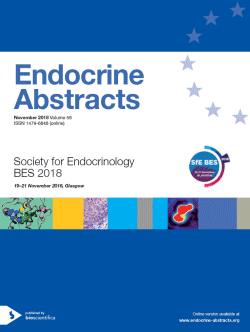Searchable abstracts of presentations at key conferences in endocrinology

Society for Endocrinology BES 2018
Glasgow,
UK
19 Nov 2018 - 21 Nov 2018

The Society for Endocrinology BES will take place 19-21 Nov 2018 in Glasgow. Come and exchange knowledge, share experiences and strengthen collaborations across our global community of endocrinologists.
Symposia
Pancreatic NETs – an update
ea0059s10.1 | Pancreatic NETs – an update | SFEBES2018
Managing Pancreatic Neuroendocrine Tumours in MEN1
Pancreatic neuroendocrine tumours (pNET) in patients with MEN1 pose a particular and challenging clinical problem. Whilst patients with a pNET and clear clinical and biochemical evidence of hormonal hypersecretion are usually candidates for some form of surgical or medical therapy, the decision-making is far harder for those who are found to have a non-functioning tumour on surveillance imaging. There is a lack of knowledge of the differing biological behaviour between pNETs i...
ea0059s10.2 | Pancreatic NETs – an update | SFEBES2018
Advances in endoscopic ultrasound and endotherapy for pancreatic neuroendocrine tumour
Pancreatic neuroendocrine tumours (PNETs), although reported with increasing frequency through increased use of abdominal imaging, are rare and uncommon tumours (1 per 100,000 population) representing 12% of all pancreatic neoplasms. Preoperative diagnosis is important since a solitary small tumour without evidence of metastatic spread may be suitable for pancreatic preserving surgery such as enucleation or middle segment resection rather than more extensive resection. H...
ea0059s10.3 | Pancreatic NETs – an update | SFEBES2018
The genomic landscape of pancreatic neuroendocrine tumours
In recent years the genomic landscape of pancreatic neuroendocrine tumours (PNETs) has been elucidated through unbiased exome, whole genome and ingrated genomic analyses. Most commonly mutations in the epigenetic machinery occur ATRX / DAXX / Menin affecting 4045% of cases. Alongside this, mutations occur less frequently in the mTOR pathway and DNA repair genes. It has also been determined that 17% of cases have an underlying germline mutation. Recent dev...



